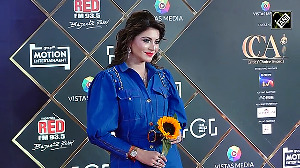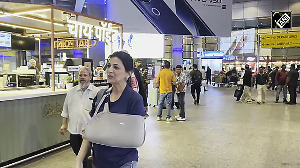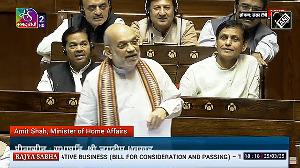Bollywood is full of interesting stories and anecdotes.
We bring you some fun facts!

Did you know Shah Rukh Khan received Rs 5,000 as the signing amount and Rs 25,000 in total for Kundan Shah's acclaimed film, Kabhi Haan Kabhi Naa?
It was ready before Baazigar and Darr but distributors weren't interested because he wasn't a star yet.
Shah Rukh bought the Bombay territory himself and helped release it.
Kabhi Haan Kabhi Naa released on February 24, 1994, 30 years ago.

Just after finishing college, while in Delhi, Amitabh Bachchan opted for a job on radio.
He gave two voice tests, in Hindi and English. A few days later, he got a letter saying he was rejected as his voice was 'unsuitable'.
Interestingly, the Big B's salary for his first film, Saat Hindustani was Rs 5,000.

Dev Anand and Suraiya fell in love during the shooting of their first film together Vidya in 1948.
The actors were shooting a song sequence in a lake, and were in a boat. She slipped, and Devsaab jumped in to rescue her.
But it was a love story that wasn't meant to be.

Besides contributing to films and television, Farooque Shaikh also did social work, albeit silently.
Did you know he funded the education of two children whose father, a waiter, was killed at the Taj hotel on 26/11?
Or that he campaigned for UNICEF's Pulse Polio for five years without charging a penny?
He also undertook the treatment of an injured light boy on Sai Paranjpye's sets without informing the unit.
A Rediff colleague recalls how Farooque Shaikh responded to a feature in the now defunct Sunday Observer newspaper about someone who needed money desparately to put his child through college, sending a cheque.

Mehboob Khan's Andaz released at the Liberty Cinema in Bombay in 1949, and starred Raj Kapoor, Nargis and Dilip Kumar.
This was Raj Kapoor's only film with Dilip Kumar even though Andaz turned out to be a blockbuster.
Composer Naushad got Mohamed Rafi to sing for Rajsaab and Mukesh to sing for Dilipsaab.
The only other time when Naushad got Mukesh to record a song on Dilip Kumar was in 1948's Mela.
That film also starred Nargis, and the song was Gaaye Jaa Geet Milan Ke Tu Apni Lagan Ke Sajan Ghar Jaana Hai.

In 1949, Raj Kapoor's Barsaat marked the debut of Composers Shankar-Jaikishan and Lyricist Hasrat Jaipuri.
Barsaat broke all records made by Andaz.
The Barsaat poster would go on to inspire R K Studios' famous logo.

Born in November 1926, Badruddin Kazi worked as a bus conductor in Bombay.
A teetotaller, Kazi was brilliant in his audition as a drunkard for Baazi.
Guru Dutt rechristened him as Johnny Walker after the whisky.

When Prithviraj Kapoor was offered work as an 'unpaid extra' by Ardeshir Irani, he reportedly asked, 'What's an extra?'
Born on November 3, 1906 in Faisalabad, he debuted in a silent film in 1928.
He also starred in India's first talkie Alam Ara, established Prithvi Theatre in 1944 and starred in over 100 films.
He died on May 29, 1972, at the age of 65.

1958's Howrah Bridge, featuring Ashok Kumar and Madhubala, had eight songs composed by O P Nayyar.
Asha Bhosle sang two, Aaiye Meherbaan and Yeh Kya Kar Dala Tune and the composer wanted her to sing one more.
But Director Shakti Samanta insisted on Geeta Dutt.
That became the film's most popular song, featuring Helen: Mera Naam Chin Chin Chu.

This man was a musician from Goa's Majorda village.
He played the violin for leading Hindi film music composers in the 1950s and 1960s.
And he inspired a song that remains popular more than four decades later.
Scroll down to see who he was.

His name was Anthony Gonsalves.
And now you're singing the song :)
The song was Composer Pyarelal's tribute to his violin teacher and real-life guru.












 © 2025
© 2025